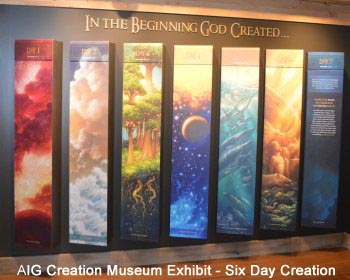Atheist's Attacks
Answering Humanist's Accusations Against the Bible


Are humanists irrational? Their reasoning is not logical nor is it based on reality. But, the truth is, they are acting in a very rational manner. If you do not want to be accountable to God, there are only two rational options: Deny God exists. That's the approach humanists have taken. Or create a god in your own image (Islam, Buddhism, Mormanism, JWs, etc.) However, creating an alternative "reality" that only exists in your mind will not save you. Only Jesus can do that. Please, you know you are disobeying God, believe and trust that Jesus can save you from His justice. And He'll do it in a just and rational way.
Another Reason Humanists Give For Rejecting The Bible
BUT, is this actually a contradiction?
HUMANIST QUESTION: Genesis chapter 1 lists six days of creation, whereas chapter 2 refers to the “day that the Lord God made the earth and the heavens.”
The humanists have made a statement and left it to you to as-sume there is a contradiction, as well as assume there is proof back-ing up that accusation. By making these types of statements, the humanists are halfway to making their point with no effort. The reader is to assume there is a contradiction, and assume the details of the contradiction. You, the reader, do all the work, based on an assumption there is contradiction or error, without that actually hav-ing been demonstrated.
To answer an accusation, we need the specifics of the accusa-tion. Based on the above, we do not know for sure what the human-ists are claiming. I will take a guess. I think they are saying the word “day” always means a 24-hour day. We all know that is absurd. We all know the word “day” has various meanings depending on its con-text. However, that is the best I can come up with given the available information.
The Answer – And Unlike the Humanists I Give Proof
Let’s start with scripture. Here is what Genesis 2:4 says:
This is the account of the heavens and the earth when they were created, in the day that the Lord God made earth and heaven.

We know that the meaning of the word “day” varies depending on its context. For example:
1) In my day, we were polite and respectful.
2) It was a three day hike to the lake.
3) It took a all day to drive to Miami.
In each of the above examples the word "day" has a different meaning, and the meaning is clearly understood from the context.
1) In example #1 "day" means a time in the past. How far in the past depends the age of the speaker.
2) A three-day hike could be a hike that started at 10 AM on Friday, and ended upon arrival at a lakeside campground at 2:00 PM on Sunday. It included parts of two separate days, and all day Saturday. It is still called a three-day hike.
3) In this case "day" refers to a time period within a 24-hour day. I used this example to show that “all” does not always literally mean all 24 hours. The drive could have taken just the major portion of the day-light hours, or it may have involved some driving at dusk or night. However, whatever the specific details are, we understand that the word “day” in this context refers to approximately the daylight por-tion of a 24-hour day.
And, of course, “day” can refer to a 24-hour day.
What Is the Context?
In Genesis chapter one the word "day" is always used with a number (one day, a second day, a third day, etc.). This context tells us it is a 24-hour day. When days are counted in the Bible, they are al-ways 24-hour days.
What is interesting is that God gives a second context. It is as though He wants to be sure we understand these are ordinary, 24-hour days. The second context is the phrase "there was evening and there was morning." What does evening and morning define? A 24-hour day. For the Israelites the new day started with sunset (evening), de-fining the nighttime portion of the day. Then came morning, defin-ing the daylight portion of the day.
God has given us two ways to know, for sure, these are 24-hour days.
What is the Context of Genesis 2:4
The context of 2:4 tells us that "day" in this case refers to a time in the past, similar to example #1 above. Just as the first verse of Genesis summarizes all of creation, "In the beginning God created the heavens and the earth." verse 2:4 is also a broad summary of creation.
Here is the way the Christian Standard Bible translates Genesis 2:4:
These are the records of the heavens and the earth, concerning their creation. At the time that the LORD God made the earth and the heavens.
We do not translation shop to find the wording that pleases us. However, reading a different translation can help clarify our un-derstanding of scripture. In this case the CSB is a reliable optimal equivalence translation, and it gives us a clear translation of “yom” (day) in the context in which it is used.
Genesis 2:4 is part of a summary of creation, and in that con-text the proper understanding is that “day” means a time in the past.
There is no contradiction.
Next question...
Genesis 1:2-3 claims that God created light and divided it from darkness on the first day; but Genesis 1:14-19 tells us the sun, moon, and stars weren’t made until the fourth day.
YOU DON'T HAVE A CHANCE
WITHOUT JESUS

What you believe does not determine reality nor truth. That would make you god. But you ARE NOT god. You don't control the universe. You cannot change reality. Let's try an experiment. At about midnight stand in the middle of the road just around a corner where it is hard to be seen... at night, wearing all black. When headlights start lighting up the curve, just believe that whatever is coming does not exist. Stand firm, if you don't believe a vehicle is coming, then nothing is coming. You are perfectly safe... until reality hits.
You are now standing before Jesus. You are dead. It's judgment day. You don't want to believe it's Jesus and you will be judged. But it is. That's reality.
Judgment only takes a moment, the verdict is obvious, and you know it is correct. You are guilty. You've lied, stolen and sexually lusted after others (Matthew 5:28)... you have disobeyed God. Trusting Jesus is the only answer, but it's too late. You had your last chance just before you died.
You know it's no use to protest, but still you scream out, 'I didn't know!'
But you did know. All of creation declared God's glory, His invisible attributes, and His power. You have no excuse. You willingly rejected Jesus Christ (God).
Is this you? Are you saying, 'Hell isn't so bad, I'll be with my friends.' You know that's not true. There are no friends in hell. No beer... not even water to cool your lips. There is NOTHING good in hell.
So I beg you, consider these words. Trust Jesus as having paid your penalty for every way you've have rejected God. Trust Jeus to save you from hell and bring you into the presense of God.
Trust Jesus. Believe in the Lord Jesus, and you will be saved. - Acts 16:31
